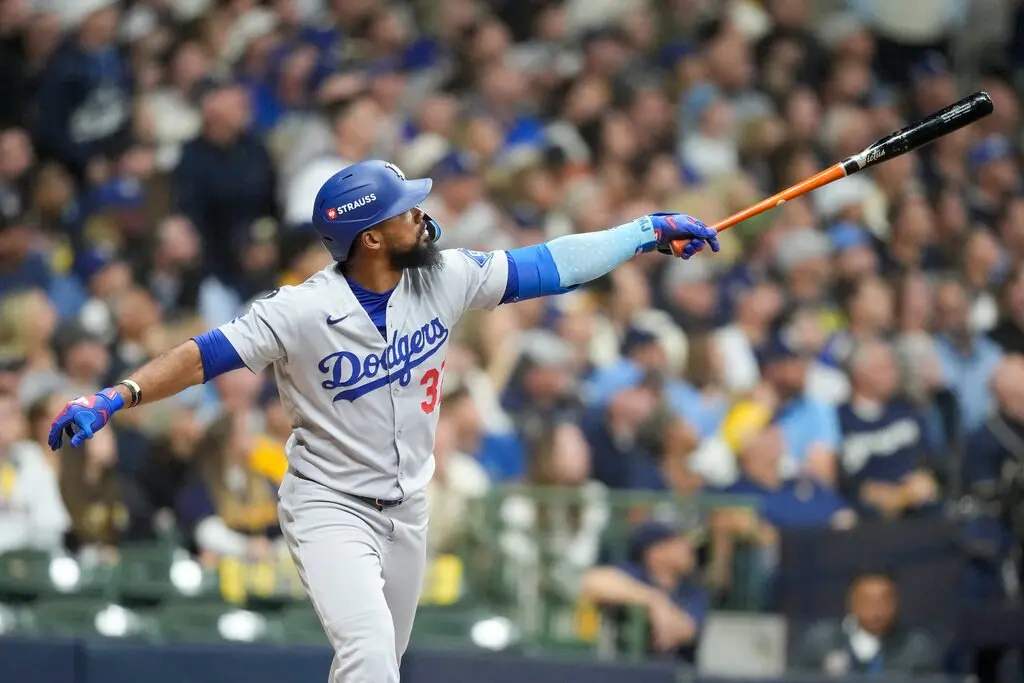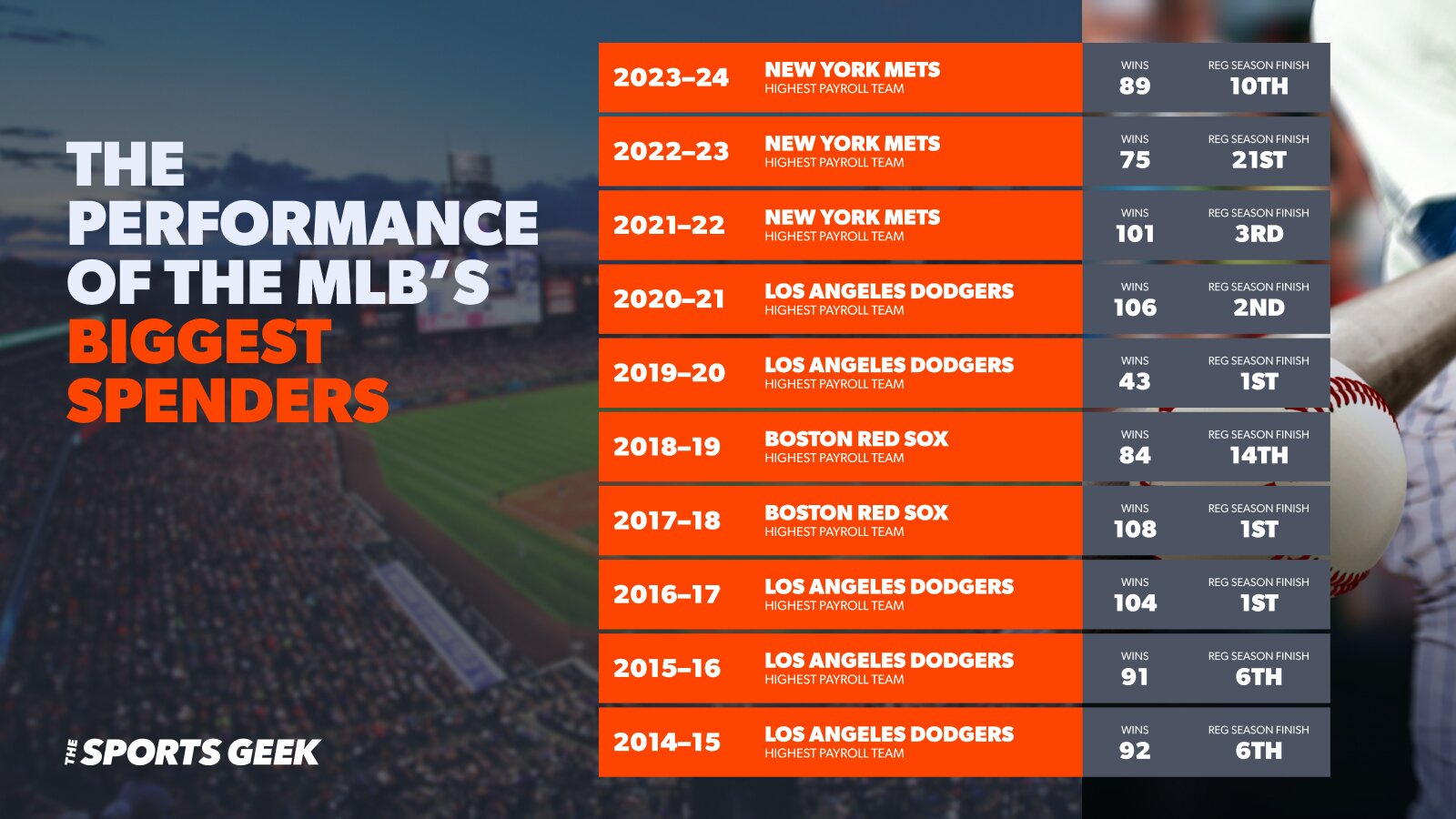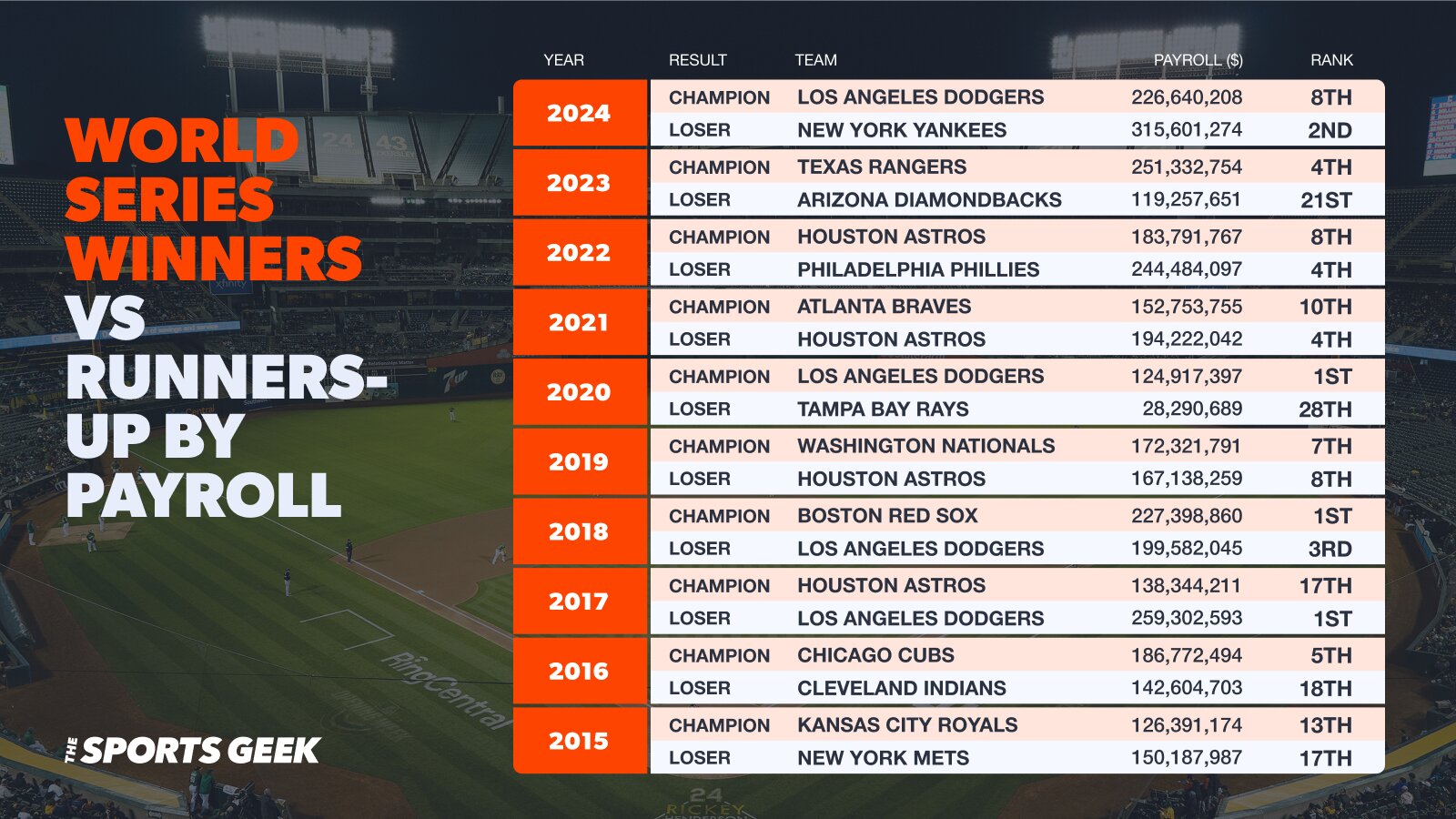
MLB Payroll Rankings: Do Baseball’s Richest Teams Win Championships?
Major League Baseball has long been divided between high-spending powerhouses and smaller-market teams. Our MLB payroll rankings reveal how much MLB payroll trends (2015–2025) influence a team’s performance.
We analyzed 10 years of the highest payroll MLB teams and regular-season win totals to determine if larger budgets really do lead to more wins. Fans can also explore the best MLB sportsbooks for betting insights and odds across every season.
The results show that while money improves a team’s odds of making the postseason, it doesn’t guarantee a World Series title. Success still depends on how effectively teams build and manage their rosters.
MLB Baseball Payroll Rankings Key Insights
- Top spenders reach the playoffs, not always the World Series. Only two of the past 10 champions had MLB’s highest payroll. On average, winners ranked 7th in spending, while runners-up ranked 10th.
- Money helps, but not as much as expected. The top 10 payroll teams averaged a 7th-place regular-season finish. Spending raises a team’s baseline, but it doesn’t guarantee elite results.
- Mid-level payrolls win most. The Astros, Braves, and Royals have won five of the last 10 titles through balanced spending and strong player development.
- High budgets don’t ensure dominance. The Dodgers have consistently ranked among the top three in payroll since 2015, yet they have secured only two championships during that period.
- 2025 fits the same pattern. The Brewers (17th in payroll) led MLB in wins. Meanwhile, mid-tier teams like the Mariners and Blue Jays made the playoffs with well-balanced rosters.
Regular Season Performance of MLB’s Biggest Payrolls
Over the past decade, baseball’s top spenders have scored strong regular-season records but inconsistent results overall. The Dodgers, Red Sox, and Mets dominated MLB payroll rankings from 2015 to 2024. However, only three of those seasons ended with the highest spender finishing first in the standings.
The Dodgers led the league in spending for five of the last 10 seasons and averaged more than 100 wins in their best years. The Mets then became the biggest spenders from 2021 to 2024 but finished as low as 21st, despite record-breaking budgets. The Red Sox were the rare exception, winning 108 games and a championship in 2018 while topping the payroll chart.
Let’s take a closer look at how these high-spending teams fared over the past decade:

Big Spenders Don’t Always Buy Wins
Over the last decade, baseball’s richest teams have dominated headlines but not necessarily the standings. Even the highest payroll MLB teams combined (the Dodgers, Mets, and Red Sox) have only had three World Series wins since 2015.
- Strong but Not Unstoppable: The highest-spending team of each of the last 10 seasons typically finishes in 6th place. Big budgets often yield winning records, but they don’t necessarily lead to league dominance.
- Savvy Spenders Succeed: Mid-tier teams like the Astros, Braves, and Royals have captured half the decade’s titles through balanced rosters and player development.
- Dodgers’ Dilemma: Despite ranking among the top three payrolls for most of the past decade, Los Angeles has only won the championship twice. This serves as a reminder that even top-tier spending can’t guarantee postseason success. Keep this in mind when betting at the top MLB sportsbooks.
Bottom line: In baseball, cash can buy talent, but not chemistry. The richest teams may reach October more often, but balance, scouting, and strategy still decide who lifts the trophy. Bettors looking ahead to next season’s contenders can check out the latest MLB futures odds for early projections.
Do World Series Champions Spend Their Way to the Top?
Payroll helps teams reach the postseason, but it doesn’t guarantee they win it all. Only half of the past ten World Series champions ranked inside the top ten in spending, while several, including the 2019 Nationals and 2015 Royals, won with more efficient payrolls.
- Top 10 trend: Five of the last six champions have ranked in the top 10 for payroll, indicating that spending helps teams remain competitive throughout long seasons.
- Different Paths to Success: Recent champions like the Rangers (4th in payroll in 2023) show how targeted spending can pay off. Meanwhile, low-payroll 2025 contenders such as the Brewers (23rd in 2025) prove that efficiency can still deliver elite results.
- Runner-up Reality: In five of the past ten seasons, the losing team outspent the champion, a reminder that money doesn’t always translate to rings.
Bottom line: Payroll buys opportunities, not outcomes. Teams that pair resources with development and adaptability consistently emerge as the most consistent winners. Check out our list of top-rated World Series sportsbooks for the latest championship odds and betting insights.
What the 2025 Playoff Picture Tells Us
Our dataset covers the payroll and performance of MLB teams from 2014 to 2024. Current figures from Spotrac indicate that the same pattern is likely to continue through 2025. Big payrolls may help teams reach October, but balance and depth still decide who stays there.
Of the top four teams that competed for a World Series berth in their respective conference championships (the Dodgers, Blue Jays, Mariners, and Brewers), only one ranked inside the top five for spending. Looking at the 2025 World Series matchup of Toronto vs. Los Angeles, both potential champions ranked in the top ten, beating out the lesser spenders. But with five teams sitting between the Jays and Dodgers’ rankings, there are still salary differences in the millions between each squad.
- Dodgers (1st): This team is one of baseball’s biggest spenders. Despite massive payrolls and consistent playoff runs, they’ve turned two championships into a decade of results.
- Blue Jays (7th): This strong upper-tier spender uses the “smart money” approach, balancing veteran contracts with homegrown depth.
- Mariners (12th): A mid-market success story built on pitching development, analytics, and efficient roster construction.
- Brewers (17th): The smallest spender still standing, leading MLB in wins and echoing efficiency-driven contenders like the 2015 Royals.
Bottom line: The 2025 postseason reinforces what a decade of MLB payroll trends (2015–2025) already shows. High-spending teams may buy more chances, but the most efficient rosters make them count. See which franchises oddsmakers expect to succeed with the latest MLB playoff odds.
World Series Winners vs Runners-Up: Money Can’t Buy the Crown
Over the past decade, payroll has helped teams reach the postseason but not necessarily win it all. From 2015 to 2024, World Series champions averaged 8th in payroll, while runners-up averaged 11th. Only two title winners, the 2020 Dodgers and the 2018 Red Sox, won with the league’s highest payroll.
Most champions emerged from the middle of the pack. These teams relied on balanced spending, roster depth, and player development rather than record-breaking budgets.

- Consistency Over Cash: Eight of ten champions ranked in the top half of payroll spending. However, only one topped the list, showing that balance matters more than extremes.
- Middle-Market Muscle: More than half of all winners ranked between 6th and 12th in payroll. Teams like the Astros, Braves, and Cubs prove that mid-tier spenders often deliver the best return on investment.
- Runner-Up Reversal: In several seasons, the losing team outspent the winner, underscoring that financial power alone doesn’t translate to postseason success.
Bottom line: Money can help build a contender, but championships are won through balance, depth, and development.
How Payroll Shapes the Regular Season
Money doesn’t guarantee championships, but it usually guarantees a winning record. Over the past decade, MLB payroll rankings have shown that the highest-spending clubs average about 95 wins per year.
- Frequent Finishers: The top payroll club landed in the top six in seven of the past 10 years.
- Dodgers Dynasty: From 2014–2021, Los Angeles averaged 98 wins per season, finishing first in the regular season four times.
- Mets Money Gap: Despite record budgets from 2022 to 2024, New York failed to reach the playoffs twice.
- Boston Balance: The Red Sox (2018) and Dodgers (2020) prove that smart spending can pay off, pairing championships with top-tier payrolls.
Bottom line: High payrolls still buy regular-season wins. However, only the teams that pair spending with strategy turn those wins into championships.
Why Smart Spending Beats Big Spending
The data reveal a clear pattern: more money helps, but smarter spending yields the best results. Successful teams distribute payroll across depth, analytics, and player development, rather than relying solely on marquee contracts.
- Balanced Budgets Win More: Teams ranked 6th–12th in payroll have claimed six of the last ten World Series titles.
- Depth Over Dollars: The Astros, Braves, and Rangers built champions around farm systems and strategic free-agent moves.
- Dodgers Paradox: Two titles in a decade, despite top spending, highlights the gap between regular-season success and postseason execution.
- Efficiency Works: The Brewers and Mariners show that sustainable success can come from resource efficiency, not just payroll power.
Bottom line: Six of this year’s 12 postseason teams rank in the top ten for payroll, yet the Brewers, at 17th, led baseball in wins. Both the data and the MLB average salary trends demonstrate that spending helps, but smart allocation wins more often.
The Real Scoreboard: Strategy Outlasts Spending
Over the past decade, baseball’s richest teams have dominated the headlines, but not the trophy case. The data shows that payroll power helps teams reach October. However, the clubs that last deep into it are those that combine investment with innovation. Whether it’s Milwaukee’s efficiency or the Dodgers’ depth, the future of baseball looks less like a bidding war and more like a balance sheet of smarter roster decisions.
Methodology
To analyze the impact of payroll on success, we reviewed 10 years of MLB team data (2015–2025).
Data Sources:
- Payroll: Total payroll allocation data from Spotrac for every MLB team, ranked from highest (1) to lowest (30) each season.
- Performance: Regular-season win totals from Baseball Reference for the same years, ranked from highest (1) to lowest (30).
Metrics Analyzed:
- Correlation between payroll rank and regular-season wins
- Average finish of top 10 payroll teams
- Payroll rank of World Series winners and runners-up each year
Purpose:
To measure whether higher payrolls consistently lead to stronger regular-season performance or postseason success, and how those trends match with the 2025 playoff contenders.




